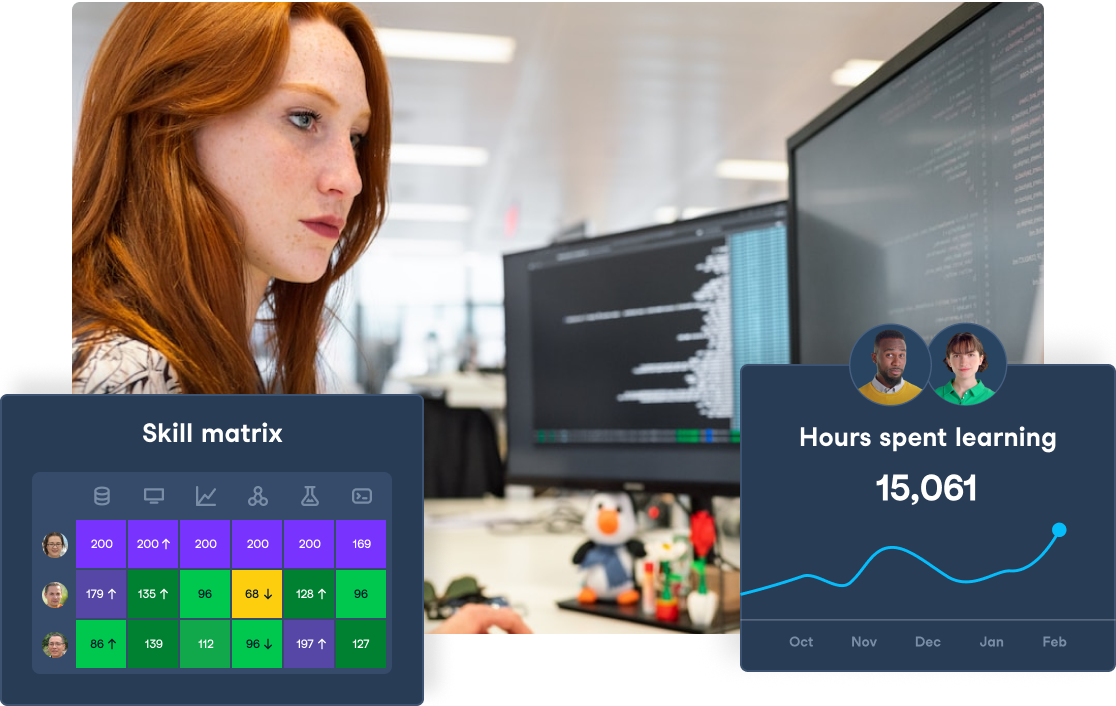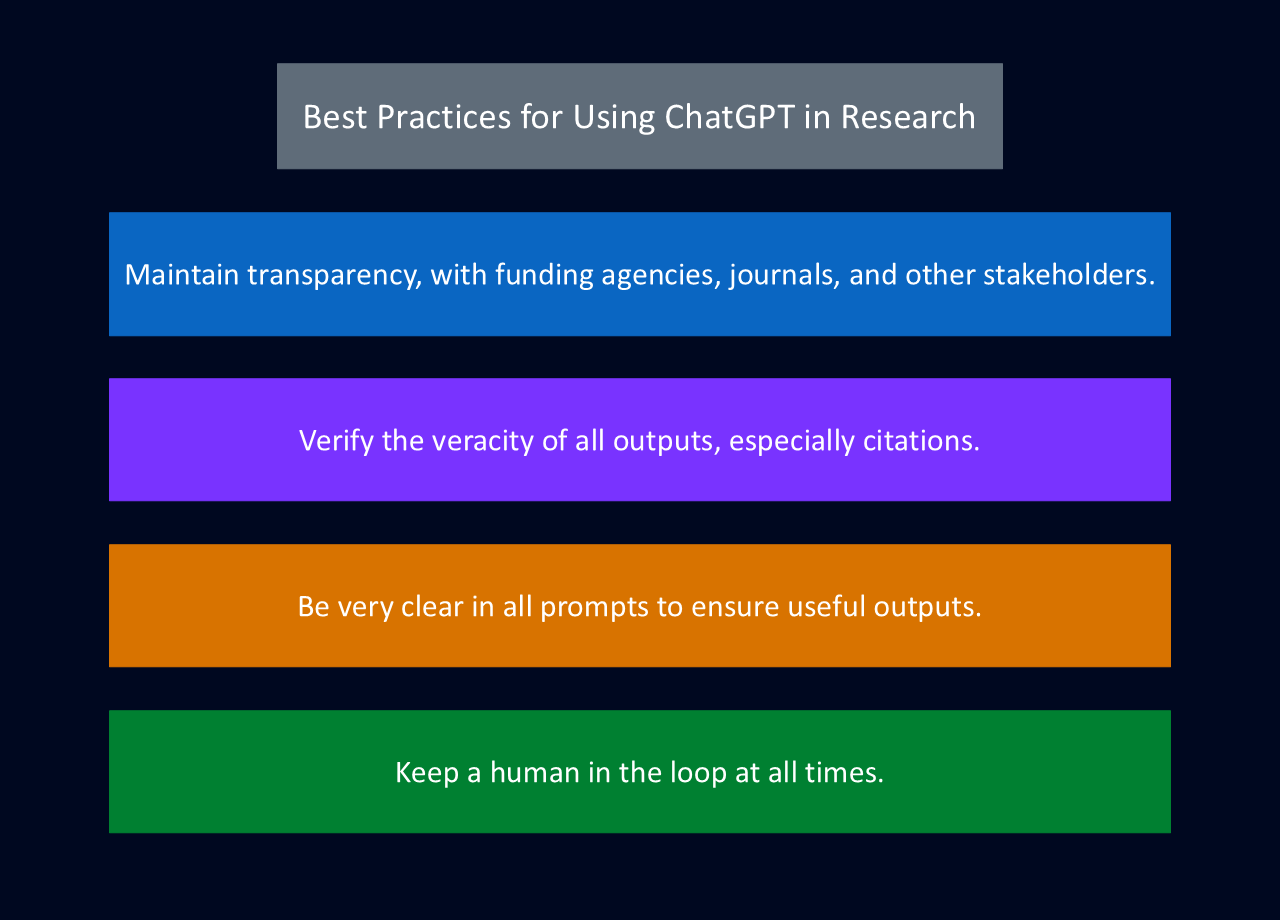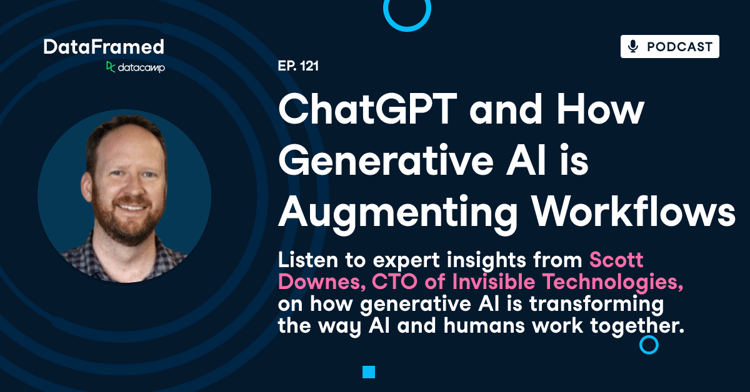Track
AI tools like ChatGPT are revolutionizing the way we conduct research. Across sectors, from academic institutions to corporate research facilities to funding agencies, ChatGPT is streamlining workflows and unlocking new opportunities.
By automating repetitive tasks and offering creative insights, it enables researchers to focus on deeper analyses and innovation. ChatGPT is helping researchers complete time-consuming tasks like summarizing literature and generating research drafts.
I have used AI myself while writing a review paper which looked at a variety of diseases and it was able to suggest some examples I hadn't thought of. I didn't rely on AI to do the writing, but it did give me some references to follow up on.
Ashley Carter, PhD, Associate Professor at California State University, Long Beach
Yet to get the most out of these new tools, researchers, academics, students, and research professionals need to master the skills to use AI in research.
Let’s explore how to harness ChatGPT for academic research, market insights, keyword analysis, and more while considering ethical and practical considerations.
Elevate Your Organization's AI Skills
Transform your business by empowering your teams with advanced AI skills through DataCamp for Business. Achieve better insights and efficiency.

How Does ChatGPT Assist in Research?
ChatGPT, OpenAI’s renowned LLM chatbot, can process and generate human-like text in response to your prompts. It was groundbreaking when it first launched and celebrated for its conversational abilities. The tool has also proven to be a powerful asset for research professionals. What’s more, its impact extends beyond academic research into market research and user research.
If you’re new to the tool and want a quick primer before using ChatGPT for research, check out our ChatGPT Fundamentals skill track, which helps you craft effective prompts and transform your workflows.
Cross-functional research needs
ChatGPT’s adaptability makes it a handy companion for researchers across disciplines and industries. When used to its full potential, it can support every stage of the research process, from generating ideas and refining hypotheses to drafting documents and writing code for data analysis.
The generative AI tool can simplify complex concepts, suggest appropriate tools and methods applicable to specific projects, and provide insights into promising areas for future exploration. Its ability to summarize literature and assist with exploratory data analysis offers researchers a quick and efficient way to gain deeper insights.
Each research project and team is different, with its own characteristics, needs and goals; ChatGPT can adapt to these varied needs, providing support that aligns with specific workflows.
Stronger collaboration and efficiency
Communication is key to collaboration in research, especially across disciplines. ChatGPT can assist in that by translating technical findings into clear, accessible language. This makes key insights fully understandable to stakeholders, such as executives and grant reviewers.
It also supports teamwork by organizing ideas, drafting shared documents, and synthesizing feedback. By reducing time spent on communication tasks, OpenAI’s tool can enable research teams to focus more on deeper problems.
Limitations
Despite its many strengths, ChatGPT does not replace deep domain expertise or rigorous experimental design. Its outputs are to be used with care, to avoid inaccuracies. It’s also important to remember that ChatGPT does not have access to real-time data, which can limit its use in time-sensitive research contexts. Though it can browse the web using ChatGPT Search, it’s general knowledge cutoff is October 2023.
Using ChatGPT for Academic Research
Most research involves ongoing work, such as literature review, proposal drafting, and synthesizing findings. ChatGPT comes in useful with tools that simplify such tasks and free you to focus your time on innovation and critical analysis.
Generating research questions and hypotheses
ChatGPT can help with developing thought-provoking research questions and hypotheses. By providing concise overviews of existing literature or suggesting angles based on emerging trends, it can help researchers narrow their focus.
It can be helpful to think of ChatGPT as a sounding board for ideas. You can have a plain-language discussion with the AI about ideas and questions you’re thinking of pursuing. This back-and-forth can help you refine your questions or even lead you to new ones.
I absolutely see this being used more and more for idea generation and draft writing. The benefits will be increased speed and results in some fields which we already have a lot of data for. AI will also be able to discover subtle interactions that aren't obvious. However, AI is predisposed to going down paths already traveled, so I think it has a real risk of reducing truly novel ideas versus increasing the pace of results on questions people already think about.
Ashley Carter, PhD, Associate Professor at California State University, Long Beach
Literature review and summarization
Sifting through large volumes of academic papers can be overwhelming. And every day, the stack of papers to read grows!
ChatGPT can shorten this stack by summarizing articles, extracting key points, and even suggesting thematic connections across studies. While it doesn’t replace critical reading, it serves as a helpful starting point. It can help researchers to prioritize materials for deeper analysis and organize their notes.
NotebookLM is another AI that helps to streamline literature reviews. You can read more about that tool in Notebook LM: A Guide With Practical Examples.
Drafting and structuring content
In academic research, writing is a core part of the job. From research papers to grant applications to white papers, academic researchers spend a fair bit of their time writing. One of my advisors once told me that it doesn’t matter if I do the best research on the planet if I never write it up for people to read.
ChatGPT can help make this fundamental research component faster and easier. It can write outlines and first drafts. It can polish the writing you’ve already done, cleaning up imprecise language and grammatical errors. It can even read your paper and use it to generate an abstract or summarize it for a funding agency.
Check out A Guide to Using ChatGPT For Data Science Projects for more ideas on how to apply ChatGPT to your data-intensive research project.
Other Key Applications of ChatGPT for Research
Beyond academic settings, ChatGPT offers applications for market research, content strategy, and user insights. It can help businesses and research organizations streamline processes, discover trends, and communicate findings effectively.
ChatGPT for market research
Market researchers often need to analyze competitors, understand customer behavior, and track industry trends. ChatGPT simplifies these tasks by generating insights and synthesizing data.
We can use ChatGPT to:
- Generate lists of competitors, summarize their strengths and weaknesses, or suggest potential market gaps.
- Analyze survey responses or identify patterns in customer feedback.
- Generate concise summaries of emerging trends in specific industries.
Keyword research using ChatGPT
Effective keyword research is important for search engine optimization (SEO) and content marketing strategies. ChatGPT can help businesses generate keyword lists tailored to their target audience and industry.
For example, ChatGPT can:
- Identify relevant keywords to boost organic traffic and align content with user intent.
- Suggest long-tail keywords or phrases to improve website visibility and engagement.
Using ChatGPT for writing research papers
ChatGPT can also serve as a writing companion, providing inspiration for structuring academic or professional research papers.
With ChatGPT, we can:
- Quickly create an abstract of our research paper.
- Create an outline tailored to our specific project and the journal we’re planning to submit it to.
- Ask ChatGPT to critically review our paper and provide feedback.
Best practices for accuracy and ethics
As powerful as ChatGPT is, using it effectively in research requires attention to accuracy as well as ethics. Without proper oversight, its outputs can include errors or misleading information, compromising the quality of your work.
To ensure accuracy, it’s important to always validate ChatGPT’s outputs. Cross-check outputs with trusted sources, double-check any math derivations, test any code outputs, etc. Use ChatGPT’s insights as starting points for deeper exploration, instead of taking them as definitive conclusions.
Ethical considerations are equally important. It’s important to be transparent about AI use in your research process. Many journals are requiring researchers to disclose their use of generative AI in their writing, like Elsevier, Wiley, and the APA.
It’s also a good idea to avoid over-reliance on ChatGPT for original ideas. You want your research team to retain its distinctive voice. Check out DataCamp’s AI Ethics course to learn more about using AI responsibly.
The goal, as always, is to strike a balance ensuring that the tool supports, rather than undermines, the rigor of your research.
How to Use ChatGPT for User Research Methods
User research is used to understand user behaviors, needs, and preferences. ChatGPT can streamline various stages of this process, allowing researchers to focus on interpreting data and deriving actionable insights.
Survey design and refinement
Designing effective surveys is a cornerstone of user research. ChatGPT can help researchers brainstorm and refine questions tailored to specific research goals. For example, it can rephrase questions for clarity or suggest follow-ups that probe deeper into user preferences. By generating varied question formats, researchers can quickly iterate and optimize their surveys for better results.
Analyzing user feedback
Processing qualitative feedback, such as open-ended survey responses or interview transcripts, is often time-intensive. ChatGPT can summarize themes, identify trends, and highlight sentiments expressed in the data. Researchers can then use these outputs to pinpoint areas of concern or opportunity for more targeted analyses.
Building user personas
Creating detailed user personas is crucial for tailoring products and services to target audiences. ChatGPT can synthesize data about demographics, preferences, and behaviors into cohesive personas that are easy for teams to visualize and use. These personas can guide design and development by aligning efforts with user needs.
By incorporating ChatGPT into user research workflows, teams can streamline repetitive tasks, focus on interpreting results, and create more user-centered solutions.
Benefits and Challenges of Using ChatGPT in Research
ChatGPT offers a lot of potential for research workflows. Let’s discuss some of these benefits and challenges.
Benefits
ChatGPT offers several advantages for researchers, from accelerating workflows to fostering innovation:
- It saves time by automating routine tasks like summarizing articles, drafting documents, and generating ideas.
- Its adaptability allows seamless integration into existing tools and processes.
- Its ability to simplify complex concepts supports collaboration across disciplines.
- When used effectively, ChatGPT empowers researchers to focus on deep work.
Challenges
However, there are some considerations to keep in mind:
- ChatGPT’s outputs require validation to ensure accuracy, since it may produce misleading or incorrect information.
- Ethical concerns, such as the potential for fabricated citations or over-reliance, need to be considered, and it’s important to be transparent about its use with stakeholders.
- ChatGPT cannot perform specialized data analysis or experimental tasks. It is essential to use expert knowledge and appropriate tools alongside ChatGPT.
|
Benefits |
Challenges |
|
Saves time on routine tasks |
Risk of confident, but misleading outputs |
|
Supports creativity and brainstorming |
Ethical concerns, including overuse and plagiarism |
|
Integrates with other tools |
Inconsistencies in the quality of responses |
|
Simplifies complex concepts for clarity |
Limited capability for specialized analysis |
To get the most out of ChatGPT and avoid some of its pitfalls, it’s important to be informed about how ChatGPT works, best use practices, and recent changes in the technology. Keeping your research team up to date is easy with DataCamp for Business.
We were cautiously excited, but we did not expect this level of engagement. It went like gangbusters.
Jeremy Petranka, Assistant Dean, MQM Program
Your research team can learn the basics of this tool with ChatGPT Fundamentals or develop more advanced skills in Intermediate ChatGPT. This technology is developing at a rapid pace. So, it’s important for research teams to keep up with this dynamic tool.
Elevate Your Organization's AI Skills
Transform your business by empowering your teams with advanced AI skills through DataCamp for Business. Achieve better insights and efficiency.

Best Practices for Using ChatGPT in Research
Here are some best practices to maximize ChatGPT’s effectiveness while maintaining research integrity. The goal here is to ensure that outputs are accurate, ethical, and tailored to specific research needs.
Refine your prompts for clarity
The quality of ChatGPT’s output depends on the clarity and specificity of the input. Use detailed prompts to guide the tool effectively. This might include summarizing a dataset, framing a research question, specifying the desired format (e.g., list, summary, or detailed explanation), or defining the tone or style for a draft.
This specificity in prompting ChatGPT is called prompt engineering, which you can learn more about in DataCamp’s Understanding Prompt Engineering course or A Beginners Guide to ChatGPT Prompt Engineering.
Combine AI insights with human expertise
ChatGPT is a tool, not a replacement for expert judgment. Always review and refine its outputs. For example, while it can draft a research abstract, a human should always read and edit the abstract to ensure accuracy and alignment with project goals.

Validate outputs for accuracy
AI-generated content should always be cross-referenced with trusted sources. In research, accuracy is non-negotiable. It is especially important to double-check citations, as I’ve found that ChatGPT often confidently suggests non-existent, or unreliable, citations.
Use ChatGPT’s outputs as starting points, not as definitive answers.
Approach ChatGPT like asking your neighbor’s bright kid for advice. They might have some great ideas, but you don’t want to trust them with anything important. So, you’ve got to verify everything you ultimately want to publish, but along the way, it can help you quickly cycle through bad ideas and try out some promising ones that just might set you on a better path to solving problems.
Matthew McHenry, PhD, Professor and Vice Chair, University of California, Irvine
Maintain ethical standards
Lastly, always ensure transparency when using ChatGPT in your research process. Avoid plagiarism by attributing AI-generated ideas appropriately and verifying that citations are valid. Ethical use of AI builds trust in your work and is required by many academic journals.
Conclusion
ChatGPT is changing the way researchers approach their work. However, as with any tool, its effectiveness depends on how it’s used.
Explore how DataCamp for Business can empower your research teams with cutting-edge AI training. Equip your institution with the skills to use tools like ChatGPT effectively and drive impactful results. Check out DataCamp for Teams and learn why data literacy is more important than ever!
ChatGPT for Research FAQs
What kind of research can ChatGPT be used for?
ChatGPT has uses in all kinds of research, from academic research to market research and even user research.
How can ChatGPT help with research?
ChatGPT can help formulate ideas, clarify hypotheses, summarize literature, suggest tools and techniques, and much more!
What are some things to watch out for?
Always double-check ChatGPT’s outputs for accuracy. It may confidently lie.
What are some ethical considerations?
It’s important to be transparent, especially with funding agencies or journals that request transparency. It’s also important to avoid over-reliance on the technology, and spend some AI-free time thinking about your research project.
What skills do I need to incorporate ChatGPT into my research workflow?
Two main skills to develop are critical thinking and prompt engineering. You’ll want to critically evaluate all outputs. Prompt engineering can help you get better output, faster.

I am a PhD with 13 years of experience working with data in a biological research environment. I create software in several programming languages including Python, MATLAB, and R. I am passionate about sharing my love of learning with the world.
